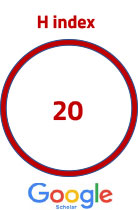| Acceptance rate | 46% |
|---|---|
| Time to first decision | 6 months* |
| Time to decision with review | 50 days* |
*Approximate number of days
**The days mentioned above are averages and do not indicate exact durations. The process may vary for each article.
2 Department of Pharmacology and Therapeutics, College of Medicine, University of Ibadan, Nigeria
3 Department of Pharmacology and Therapeutics, Faculty of Basic Clinical Science, University of Medical Sciences, Ondo, Nigeria
DOI : 10.23893/1307-2080.APS.05908 Viewed : 16868 - Downloaded : 4122 Abrus precatorius L. is a woody twinning climber, a member of the Fabaceae family indigenous to parts of Asia and Africa. It has been used widely in traditional medicine for curing many conditions such as malaria, sores, chest pain, cough, inflammation and many others. It was also reported that the hot water extract of the leaves and the roots have been used in treating persons suffering from episodes of convulsions in Tanzania. The aim of this present study was to evaluate the anti-convulsant, anxiolytic and sedative activities of the methanol extract of A. precatorius (Linn.) leaves in-vivo using murine models of convulsion, anxiety and sedation.
The anticonvulsant activity of ethanol extract of A. precatorius leaves was investigated using pentylene tetrazole, strychnine and picotoxin-induced convulsion. Anxiety tests used included head dips and elevated plus maze. Phenobarbitone-induced sleeping test was used to assess the sedative effect of A. precatorius. Safety of the extract was determined using the brine shrimp lethality assay.
Preliminary phytochemical screening on the dried and powdered leaves indicated that alkaloids, tannins, flavonoids and saponins, with a yield of 17.40%are present in the leaves. The brine shrimp lethality assay showed a LC50 of 8.189µg/ml.Results from the in-vivo neuropharmacological profile of the crude methanol extract of the leaves at doses of 200,400 and 800mg/kg body weight had central effects although not significant ones compared with diazepam which was used as the standard. The results from the convulsion studies expressed as percentage protection indicates that 400mg/ kg and 800mg/kg had 25% protection against pentylenetetrazol induced convulsions.
The methanol extract of A. precatorius leaves might possess anticonvulsant and sedative activities, thus justifying its use in the management of epilepsy.
Keywords : Anticonvulsant, Anxiolytic, sedative, Abrus precatorius, epilepsy




